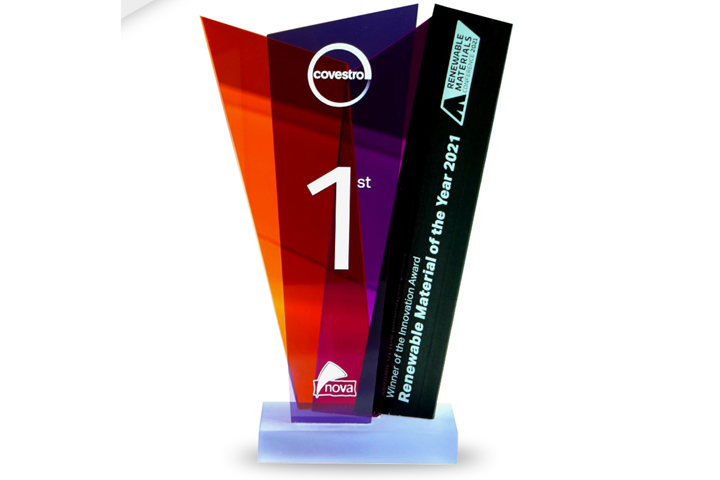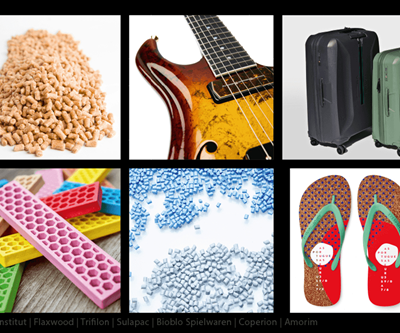Renewable Materials Conference 2021 announces innovation award winners
Three winning innovations include a hemp fiber and thermoset bioresin chair collection, PET bottles made from enzymatically recycled textile waste and CO2-based household cleaners.

Photo Credit: Covestro AG
On May 20, the winners for the innovation award, “Renewable Material of the Year 2021” held at the three-day Renewable Materials Conference 2021 were announced. The three winners include Plantics and Vepa (Netherlands) for a hemp fiber and thermoset bioresin chair collection; LanzaTech (Skokie, Ill., U.S.) for household cleaners produced from recycled carbon from steel emissions; and Carbios (France) for enzymatic recycling of PET, respectively. According to event organizers, this was the first time innovations highlighted covers bio- and CO2-based chemicals and materials, as well as chemical recycling.
The conference advisory board previously selected six companies from 36 individually listed innovative submissions to showcase their technologies and applications to the event audience. All products presented, per the award’s eligibility, were already available on the market or will be launched soon. The three winners were selected by the participants on the second day of the conference. The innovation award was sponsored by Covestro (Leverkusen, Germany) and awarded jointly with the nova-Institute (Hürth, Germany).
First-place winner, Dutch furniture manufacturer , has launched a collection of chairs with a shell of a biomaterial made of hemp fiber and bioresin. Both are fully biological, plant-based and recyclable. Vepa says the bio-based resin and material are part of a new family of bio-based materials that has been developed by and is patented worldwide for many different applications. Plantics and Vepa collaborated intensively for two years to turn the biomaterial into a high-quality seat shell. The collection is produced entirely in the Netherlands and currently includes chairs and bar stools. The production process absorbs more CO2 than it emits. In addition, the chairs are designed in such a way that the various parts are easy to separate and materials can reportedly be reused endlessly.
Second-place winner, , claims to be the first company that has developed biological processes to revolutionize the end-of-life of plastics and textiles. The enzymatic recycling technology reportedly deconstructs any type of PET plastic waste into its basic components (monomers) which can then be reused to produce new PET plastics of virgin quality, particularly for suitable for the production of clear bottles, which the company first produced back in 2020.
, the third-place winner, launched a range of liquid cleaning products containing its CarbonSmart Ethanol as part of retail company Migros (Zurich, Switzerland) Plus Oeco Power and Potz cleaning ranges; these products are now on sale in Migros supermarkets in Switzerland. The CarbonSmart Ethanol is produced from recycled carbon from steel emissions, which reportedly reduces greenhouse gas emissions, protects biodiversity and avoids land-use change. The significant contribution to sustainability was validated through an independent life cycle analysis and the approach received support from experts at WWF in Switzerland.
The Nova-Institute would like to thank all sponsors, partners and media partners whose support contributed to the conference. The innovation award was sponsored by Covestro. Neste, Sorona, SUGAR ENERGY and UPM support the conference as Gold Sponsors, Alfa Laval, FKuR, MMAtwo, Photanol/Renolit as Silver Sponsors and LanzaTech as a Bronze Sponsor.
The next conference is planned as a hybrid event in May 2022. Further information on the next conference will be made available.
Related Content
Composites end markets: Sports and recreation (2025)
The use of composite materials in high-performance sporting goods continues to grow, with new advancements including thermoplastic and sustainability-focused materials and automated processes.
Read MoreToray rCF from Boeing 787 is incorporated into ultra-light laptops
Torayca-based aerospace components have successfully been repurposed into the Lenovo ThinkPad X1 Carbon Gen 12, highlighting the ongoing application of recycled composites.
Read MoreInjection molding expertise achieves composites mobility innovation
JEC World 2025: A partner in three JEC Award products, Engel demonstrates how its injection molding equipment can set new benchmarks in applications like bike handlebars and interior vehicle components.
Read MoreGlass fiber-reinforced Akulon RePurposed recyclate enables Ahrend sustainable office chair
Envalior 30% glass fiber-reinforced Akulon RePurposed material helps Ahrend achieve lighter task chair with closed-loop value chain and reduced emissions.
Read MoreRead Next
Nova-Institute releases list of European biocomposite producers
According to the report, there are 30 producers of biocomposite granules producing almost 130,000 tons of sustainable materials.
Read MoreCeramic matrix composites: Faster, cheaper, higher temperature
New players proliferate, increasing CMC materials and manufacturing capacity, novel processes and automation to meet demand for higher part volumes and performance.
Read MoreCutting 100 pounds, certification time for the X-59 nose cone
Swift Engineering used HyperX software to remove 100 pounds from 38-foot graphite/epoxy cored nose cone for X-59 supersonic aircraft.
Read More












